专题七:动词
高考英语考点分类汇编(近3年真题+模拟)专题七 动词时态和语态
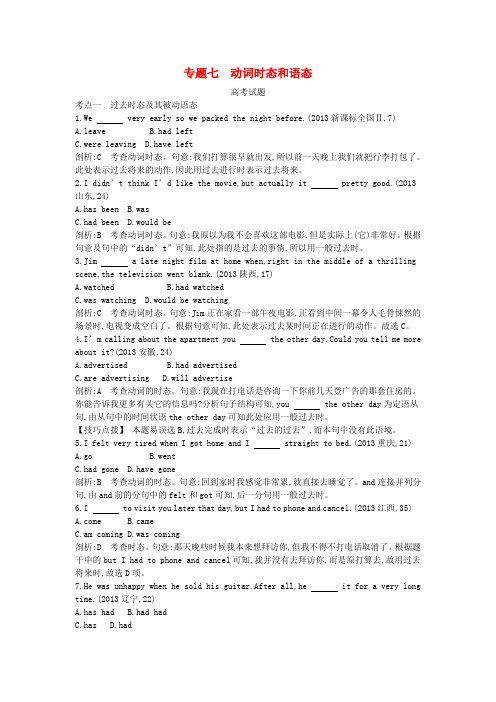
专题七动词时态和语态高考试题考点一过去时态及其被动语态1.We very early so we packed the night before.(2013新课标全国Ⅱ,7)A.leaveB.had leftC.were leavingD.have left剖析:C 考查动词时态。
句意:我们打算很早就出发,所以前一天晚上我们就把行李打包了。
此处表示过去将来的动作,因此用过去进行时表示过去将来。
2.I didn’t think I’d like the movie,but actually it pretty good.(2013山东,24)A.has beenB.wasC.had beenD.would be剖析:B 考查动词时态。
句意:我原以为我不会喜欢这部电影,但是实际上(它)非常好。
根据句意及句中的“didn’t”可知,此处指的是过去的事情,所以用一般过去时。
3.Jim a late night film at home when,right in the middle of a thrilling scene,the television went blank.(2013陕西,17)A.watchedB.had watchedC.was watchingD.would be watching剖析:C 考查动词时态。
句意:Jim正在家看一部午夜电影,正看到中间一幕令人毛骨悚然的场景时,电视变成空白了。
根据句意可知,此处表示过去某时间正在进行的动作。
故选C。
4.I’m calling about the apartment you the other day.Could you tell me more about it?(2013安徽,24)A.advertisedB.had advertisedC.are advertisingD.will advertise剖析:A 考查动词的时态。
句意:我现在打电话是咨询一下你前几天登广告的那套住房的。
2023年中考英语复习专题七——动词(含答案)

2023年中考英语复习专题七——动词命题点1 感官动词辨析( )1.(2021·河北)The trip really exciting to me. How I wish to go!A.soundsB.smellsC.tastesD.feels( )2.(2022・青海)Mom is cooking chicken soup.It so good.A.soundsB.tastesC.smells( )3.(2021·乐山)Your idea good.Let's give it a try and see if it will work.A.soundsB.smellsC.looks( )4.(2021·襄阳)-How does the banana milk shake ?-Delicious.I'd like to have another glass.A.lookB.smellC.tasteD.sound命题点2 实义动词辨析( )5.(2022·长春)Don’t be upset.Sometimes challenges can the best in us. A.bring out B.work out C.hand out D.hang out( )6.(2022·泰州)We should pay much attention to saving natural resources.Otherwise,they will one day.A.put outB.run outC.get outD.sell out( )7.(2022·抚顺)Our national hero Yue Fei to devote (贡献)himself to the country at a young age.A.failedB.forgotC.promisedD.refused( )8.(2021·抚顺)Junior high school days are over and it’s hard to our dear teachers and friends.A.separate fromB.deal withC.believe inD.depend on ( )9.(2022·河池)-Bob,please your spelling.You’ve dropped the“d” in the word “knowledge”.-Oh,yes.I'll be more careful next time.A.listen toB.look forward toC.pay attention toD.get used to ( )10.(2022·南通)Five-star hotels can first-rate service,making passengers feel at home.A.provideB.preventC.protectD.prepare( )11.(2021·南通)-Honey,could you help me the picture of colorful balloons from the paper?-OK. Mum.I'm coming!A.cut outB.carry outC.turn outD.work out( )12.(2022·大庆)My mother often me a story in the evening.A.tellsB.saysC.speaksD.talks( )13.(2022·滨州)-Henry,did you drive back to your hometown during the Spring Festival?-No, I was to take the train because the traffic is often the busiest at that time. A.praised B.taught C.warned D.advised( )14.(2021·滨州)Pan Jianwei has become a famous scientist.When he was a child,he liked to how things worked.A.set outB.find outC.leave outD.bring out( )15.(2022·玉林)-Why did he your invitation that day?-Because he had an important meeting.A.turn downB.put awayC.turn upD.cut down( )16.(2022·丹东)Mother’s Day us once every year to be thankful to mothers.A.remindsB.warnsC.requiresD.promises( )17.(2021·丹东)I’ll go to senior high school soon.I can’t believe how fast the time !A.went onB.went offC.went byD.went out( )18.(2022·襄阳)-Would you please what you said?-Sure.I asked you to have a rest.It's too hot today.A.showB.spellC.reviewD.repeat( )19.(2021·襄阳)-Why does our chemistry teacher often her?-Because she gets full marks in chemistry every time.A.praiseB.forgetC.controlD.hurt( )20.(2022·临沂)The minute the alarm clock ,I got up and took a quick shower.A.went byB.went outC.went off( )21.(2022·贵港)-What do you think of Jack?-He is honest.All of us him.A.trust B.refuse C.protect D.hate( )22.(2021·贵港)-What is Tom doing?-He is the English speech in the hall.A.paying forB.preparing forC.caring forD.looking for( )23.(2022·梧州)-What happened to Robert?-He from the tree and hurt his left leg.A.fell downB.fell overC.went offD.went by( )24.(2021·朝阳)-Hurry up!Our plane will soon.-Don't worry.We still have enough time.A.take downB.take offC.take upD.take after( )25.(2022·鞍山)-The summer vacation is coming.Do you have any plans?-I'm going to a hobby like playing the guitar.A.cut upB.look upC.turn upD.take up( )26.(2022·宿迁)-Suzy,your room is really in a mess.-Sorry,Mum.I'll right now.A.tidy upB.put upC.look upD.stay up( )27.(2022·黄石)It’s parents’ job to a clean and comfortable environment at home their children.A.support;withB.offer;withC.give;forD.provide;for( )28.(2022·黄石)-How long may I your magazine?-For one week.But it mustn't to others.A.borrow;lendB.keep;be lentC.lend;be borrowedD.have;lend ( )29.(2022·北部湾经济区)Tony his grandfather in the hospital last summer.A.looked afterughed atC.pointed atD.ran after( )30.(2022·铜仁)-Mike,can you tell me the meaning of the letters“KIT”?-Don't you know that? They “keep in touch”.A.search forB.ask forC.look forD.stand for( )31.(2021·黔东南)Our government is looking for some ways,including the 3-child policy to the problem of ageing population(人口老龄化).A.agree withB.start withpare withD.deal with( )32.(2022·天津)My aunt offered me a dictionary and I it happily.A.acceptedB.invitedC.mixedD.grew( )33.(2021·黔东南)-What about going for a picnic this weekend?-I'd like to,but the final exam is coming.I to stay at home.A.preferB.discoverC.refuseD.achieve( )34.(2022·齐齐哈尔)Elephants are smart animals.They have good memories.They can walk for a long time and never .A.get madB.get lostC.get worried( )35.(2021·吉林)I want to make Russian soup.Could you please the tomatoes for me?A.cut upB.get upC.dress up( )36.(2022·贺州)You should your shoes before you enter the dancing room.A.get off B.put off C.take off D.fall off( )37.(2022·新疆)-Why didn’t you go to my party last night?-Sorry,I was for the English test at that time.A.caringB.lookingC.studyingD.searching( )38.(2022·武汉)-Laura spoke very slowly to people to what she would say. -She just wanted to think about what others were feeling.A.surveyB.weighC.supportD.repeat( )39.(2022·武汉)-Jack,tell me how to this information.-All right,Grandma.You can type it on this key-board.A.deleteB.enterC.collectD.receive热点预测( )40.People in these areas calm colours to warm colours in their homes. A.protect B.prefer C.pronounce D.practise参考答案1-5 ACACA 6-10 BCACA 11-15 AADBA 16-20 ACDAC21-25 ABABD 26-30 ADBAD 31-35DAABA 36-40CCBBB。
高考英语单词变形速记精练:专题07 巧记不规则动词(ABB型) (解析版)
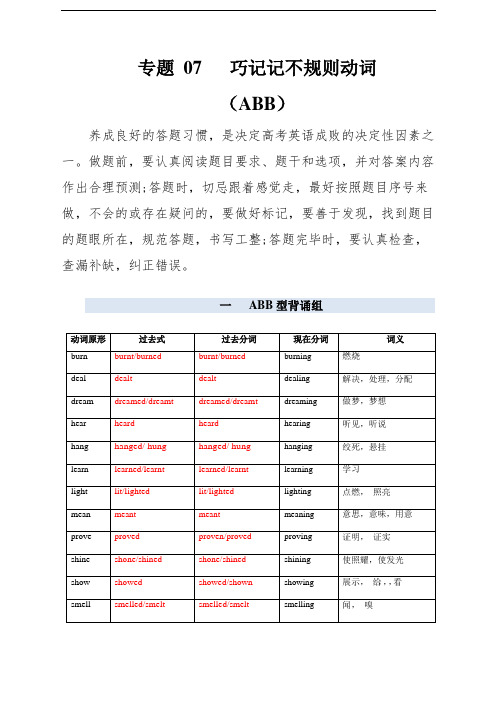
专题07 巧记记不规则动词(ABB)养成良好的答题习惯,是决定高考英语成败的决定性因素之一。
做题前,要认真阅读题目要求、题干和选项,并对答案内容作出合理预测;答题时,切忌跟着感觉走,最好按照题目序号来做,不会的或存在疑问的,要做好标记,要善于发现,找到题目的题眼所在,规范答题,书写工整;答题完毕时,要认真检查,查漏补缺,纠正错误。
一ABB型背诵组二ABB型默写三ABB型背诵把辅”构成四 ABB 型默写五 ABB 型背诵原形→ought →ought六ABB型默写七ABB型背诵原形→aught→aught八ABB型默写九ABB型背诵变其中一个元音字母十ABB型背诵十一ABB型默写十二ABB型背诵原形→l t/pt/ft→lt/pt/ft十三ABB型默写十四ABB型背诵(其它)十五ABB型默写(其它)模拟演练1.I was (stick) at home with flu. (所给词的适当形式填空)【答案】stuck【详解】考查动词。
句意:我因流感被困在家里。
分析句子结构可知,I与stick构成被动关系,空处需要过去分词和空前的was构成一般过去时态的被动语态。
故填stuck。
2.I visited the new and improved Community Sports Centre. It is not open to the public yet, but preparations (make) presently for the reopening. (所给词的适当形式填空)【答案】are being made【详解】考查时态和语态。
句意:我参观了新建的社区体育中心。
它还没有对公众开放,但目前正在为重新开放做准备。
此处缺乏谓语,主语preparations与谓语动词make之间是被动关系,要用被动语态。
根据presently可知,应用现在进行时,即现在进行时的被动语态(am/is/are being done),主语preparations是复数,谓语也用复数形式。
英语中考总复习专题(七) 动词语态学案
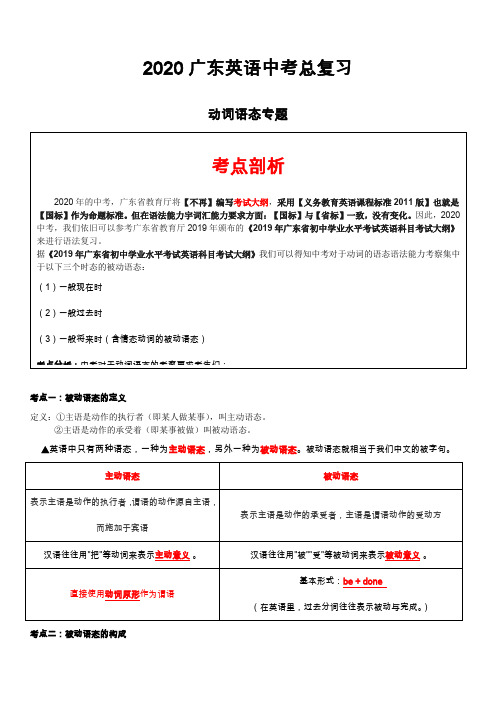
2020广东英语中考总复习动词语态专题考点剖析2020年的中考,广东省教育厅将【不再】编写考试大纲,采用【义务教育英语课程标准2011版】也就是【国标】作为命题标准。
但在语法能力宇词汇能力要求方面:【国标】与【省标】一致,没有变化。
因此,2020中考,我们依旧可以参考广东省教育厅2019年颁布的《2019年广东省初中学业水平考试英语科目考试大纲》来进行语法复习。
据《2019年广东省初中学业水平考试英语科目考试大纲》我们可以得知中考对于动词的语态语法能力考察集中于以下三个时态的被动语态:(1)一般现在时(2)一般过去时(3)一般将来时(含情态动词的被动语态)考点分析:中考对于动词语态的考察要求考生们:考点一:被动语态的定义定义:①主语是动作的执行者(即某人做某事),叫主动语态。
②主语是动作的承受着(即某事被做)叫被动语态。
英语中只有两种语态,一种为主动语态,另外一种为被动语态。
被动语态就相当于我们中文的被字句。
考点二:被动语态的构成例:Kites is flown by him. 风筝被他放I was invited to the meeting last night. 我做完被邀请出席会议Cars will be sent abroad by sea. 汽车将通过海路被运往国外。
A great many letters can be written with the computer by him. 大量的信能被他用电脑写。
考点三:主动语态变被动语态(writing)步骤:①将主动语态的宾语改为被动语态的主语②将主动语态的谓语动词改为‘be done’③将主动语态的主词改为介词by之后的宾语,放在谓语动词之后(有时可省略)例:He cleans the room.→The room is cleaned by him.含直接宾语和间接宾语的主动语态改为被动语态时有两种情况:①把间接宾语改为被动语态的主语,直接宾语仍保留原位;②把直接宾语改为主动语态的主语,此时,间接宾语前要加介词to或for。
初中英语语法专题七 非谓语动词

2.不定式的句法作用 动词不定式具有名词、形容词和副词的作用,它 可以作主语、表语、宾语、宾语补足语、定语和状语 等。 (1)作主语 动词不定式作主语时,常用it作形式主语,而将 真正的主语放在句末,It+be+形容词+(for sb.)+动 词不定式。
It's important (for us) to protect the environment. (对我们来说)保护环境是很重要的。 注:当在 kind,good,nice,clever 等表示人的品 质的形容词后,不用 for 而用 of。 It's very kind of you to help me.你帮助我真是太好 啦。
Please try to do better next time. 请下次设法做得更 好些。 He tried speak ing English to us. 他试着用英语和我 们谈话。
Go on to do the other exercise after you finish this one. 做完这个练习题后,接着做另一个练习题。 Go on doing the exercise after a short rest. 休息一会儿之后继续做练习。
其后既可以接动词 -ing形式,也可接动词不定 式 的动词及动词词组 有love, like, prefe r, be gin, s tart, continue, remembe r,try, s top, forget, hate,need,allow,go on等。
介词后接动词-ing形式的动词短语有 keep...from,stop...from,make a contribution to, look forward to,spend...(in),be afraid of,be proud of,be used for,feel like,give up,be interested in,put off等。
高考英语专题历年真题汇编动词的时态和语态-三年高考
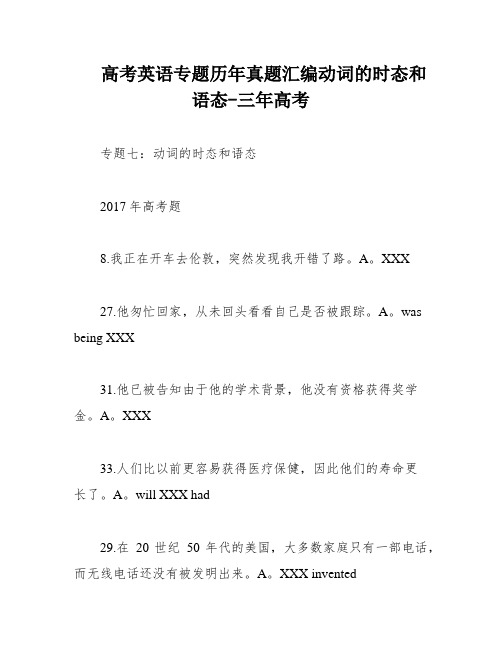
高考英语专题历年真题汇编动词的时态和语态-三年高考专题七:动词的时态和语态2017年高考题8.我正在开车去伦敦,突然发现我开错了路。
A。
XXX27.他匆忙回家,从未回头看看自己是否被跟踪。
A。
was being XXX31.他已被告知由于他的学术背景,他没有资格获得奖学金。
A。
XXX33.人们比以前更容易获得医疗保健,因此他们的寿命更长了。
A。
will XXX had29.在20世纪50年代的美国,大多数家庭只有一部电话,而无线电话还没有被发明出来。
A。
XXX invented24.昨天你去拜访那家公司了吗?A。
Did you visitB。
Have you XXX visitingYes。
they are happy with it.Jack was working in the lab when the power cut occurred.We have been waiting here for more than two hours.I have read half of the English novel and I'll try to finish it at the weekend.The students have been working hard on their lessons and their efforts will be rewarded with success in the end.5.More efforts will be made in the years ahead to accelerate the supply-side structural reform。
XXX.6.Dashan。
XXX。
aims to blend it with the Western stand-up n.7.When walking down the street。
语法系列复习总结专题七-动词时态-被动语态

语法系列复习专题七-----动词时态,被动语态一、一般现在时1.一般现在时表示经常发生、习惯性动作、客观真理、科学事实、格言,目前的特征、状态、能力等。
2.主句是一般将来时,时间、条件状语从句中用一般现在时表示将来。
如:I ll go there after I finish my work./ If it rains tomorrow,I won t go there.3.在以here,there开头的句子里,go,come等少数动词的一般在时表示正在发生的动作。
例如:There goes the bell.铃响了。
There comes the bus.汽车来了。
Here she comes.她来了。
二、一般过去时表达特定的过去时间内发生的动作或存在的状况,或过去某一时间内经常发生或反复发生的动作或行为。
三、现在进行时1.表示正在进行的动作。
2.表示按计划安排即将发生的动作。
例如:She is leaving for Beijing.她要去北京。
He is working as a teacher tomorrow.从明天起他要做老师。
My father is coming to see me this Saturday.这个星期六我爸爸要来看我。
3.代替一般现在时,描绘更加生动。
例如:The Changjiang River is flowing into the east.江水滚滚向东流。
The sun is rising in the east.太阳从东方冉冉升起。
4.大多数动词可用于进行时,但也有些动词不用于进行时。
常见的有:exist,live,understand,mean,owe,belong to ,know,doubt,suppose,remember,forget,believe,trust,want,wish,refuse,like,hate,dislike,prefer,mind,hope等。
高三英语 基础知识必备 专题七 非谓语动词
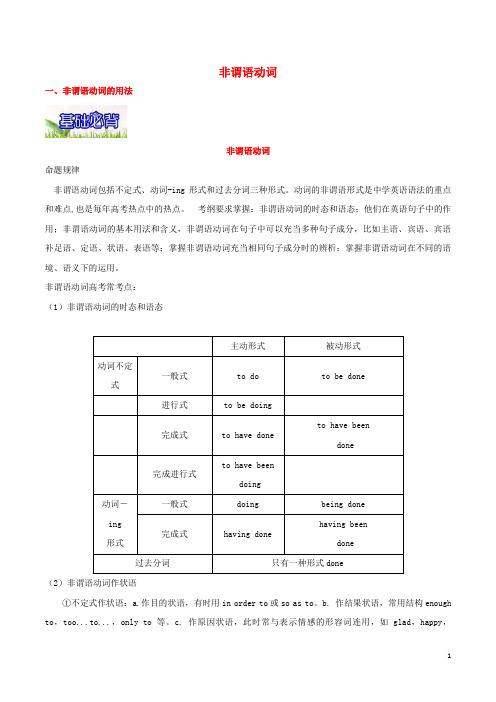
非谓语动词一、非谓语动词的用法非谓语动词命题规律非谓语动词包括不定式、动词-ing形式和过去分词三种形式。
动词的非谓语形式是中学英语语法的重点和难点,也是每年高考热点中的热点。
考纲要求掌握:非谓语动词的时态和语态;他们在英语句子中的作用;非谓语动词的基本用法和含义,非谓语动词在句子中可以充当多种句子成分,比如主语、宾语、宾语补足语、定语、状语、表语等;掌握非谓语动词充当相同句子成分时的辨析;掌握非谓语动词在不同的语境、语义下的运用。
非谓语动词高考常考点:(1)非谓语动词的时态和语态主动形式被动形式动词不定式一般式to do to be done进行式to be doing完成式to have doneto have beendone完成进行式to have beendoing动词-ing 形式一般式doing being done完成式having donehaving beendone过去分词只有一种形式done(2)非谓语动词作状语①不定式作状语:a.作目的状语,有时用in order to或so as to。
b. 作结果状语,常用结构enough to,too...to...,only to等。
c. 作原因状语,此时常与表示情感的形容词连用,如glad,happy,frightened,surprised等。
d. 在“主语+系动词+形容词+to do”的结构中,常用主动形式表示被动含义。
②动词-ing形式(现在分词)作状语:a. 动词-ing形式(现在分词)作状语时与谓语动词所表示的动作同时或几乎同时发生,having done表示先于谓语动词所表示的动作发生的动作。
b. 动词-ing形式(现在分词)可作时间、原因、方式、伴随、结果、让步等状语。
③过去分词作状语:a. 过去分词作状语时与句中主语构成逻辑上的动宾关系,且先于谓语动作发生。
b. 某些动词的过去分词已经形容词化,此时作状语时相当于形容词作状语。
2019版高考英语专题化语法讲义专题七情态动词与虚拟语气

专题七 情态动词与虚拟语气情态动词的基本用法情态动词具有一定的词义,没有人称和数的变化,必须和其他动词一起构成谓语,用 来表示愿望、态度或推测等。
You may use my dictionary.你可以使用我的字典。
(表示“允许”)You can ' t have seen him just now. He has been abroad for nearly a month.你刚才不可能看见他了,他已经出国近一个月了。
(表示“推测”)1.表示能力(2)表示将来的能力:will be able to (3)表示过去的能力could 表示过去的能力,不表示是否做was/were able to 表示过去有能力做并且成功地做了,相当于: managed to do sthJsucceeded in doing sth.could have done 表示过去本来能够做但未做 I can ' t promise anything, but I ' ll do what I can .我不能许诺什么,但我会尽力而为。
(表示现在的能力)If you have a good sleep, you will be able to work out this problem.如果你好好睡一觉,你将能够解出这道题。
(表示将来的能力)The fire spread through the hotel very quickly but everyone was able to get out.尽管这场大火迅速蔓延到了这个宾馆,但是每个人都逃了出去。
(表示过去有能力做并 且成功地做了)I could have worked out the problem, but I was too nervous.我本来可以解出这道题,但我太紧张了。
(表示本来有能力做但未做)2.表示推测(可能性)可能性可分为客观的可能性和具体事情实际发生的可能性两种。
中考英语语法专题详解七:情态动词、系动词

中考英语语法专题详解七:情态动词、系动词在英语中,表示主语动作或状态的词就叫做动词。
根据动词的意义及在句子中的作用,可将动词分为实义动词(v)、系动词(link-v)、情态动词(modal verb)和助动词(v. aux)四种类型。
下面就跟小编一起就来看看情态动词和系动词的具体用法。
专题七情态动词、系动词一、情态动词情态动词本身有一定的意义,但不能独立作谓语,要和动词原形一起构成谓语,表说话人的语气和态度。
它没有人称和数的变化。
常见的情态动词有:1. can表示能力,有“能”“会”的意思;表示可能性,多用在否定或疑问句中;表示请求和许可。
如:The parrot can speak three languages. 这只鹦鹉能讲三种语言。
Can I borrow the book from the library?我可以从图书棺借这本书吗?Shanghai can be very cold in March. 上海三月份可能会很冷。
拓展延伸can还有过去式could 可表“能,会”,又可以和be able to替换,而be able to有更多时态。
如:He could swim when he was four. =He was able to swim when he was four. 他四岁时就会游泳。
在一般疑问句中,can/could 常用来表示请求或征求对方意见,用could 比用can语气更加委婉和客气。
类似用法的还有Will /Would you (please)…等句型。
如:Could you tell me how I can get to the post office? 你能告诉我怎样到邮局吗? Would you please turn up the radio?请你把收音机开大点,好吗?2.may表示“许可”时,相当于can,其否定回答用can’t/mustn’t;表推测时,常用在肯定句中,表“可能”。
高考英语专题(7)动词的时态与语态(答案)
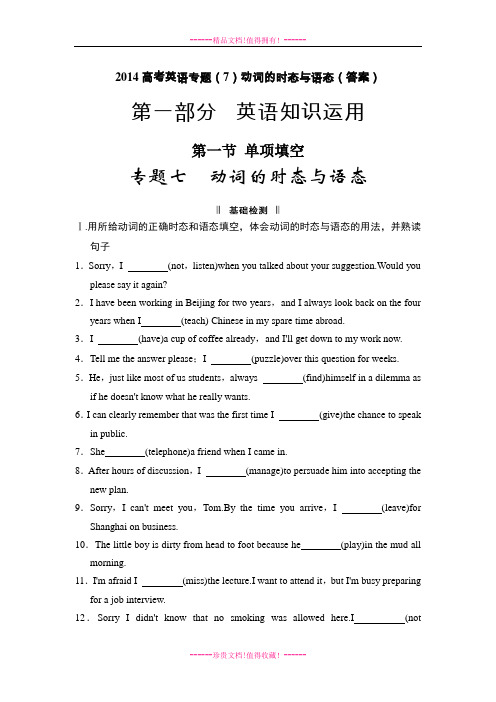
2014高考英语专题(7)动词的时态与语态(答案)第一部分英语知识运用第一节单项填空专题七动词的时态与语态Ⅰ.用所给动词的正确时态和语态填空,体会动词的时态与语态的用法,并熟读句子1.Sorry,I (not,listen)when you talked about your suggestion.Would you please say it again?2.I have been working in Beijing for two years,and I always look back on the four years when I (teach) Chinese in my spare time abroad.3.I (have)a cup of coffee already,and I'll get down to my work now. 4.Tell me the answer please;I (puzzle)over this question for weeks. 5.He,just like most of us students,always (find)himself in a dilemma as if he doesn't know what he really wants.6.I can clearly remember that was the first time I (give)the chance to speak in public.7.She (telephone)a friend when I came in.8.After hours of discussion,I (manage)to persuade him into accepting the new plan.9.Sorry,I can't meet you,Tom.By the time you arrive,I (leave)for Shanghai on business.10.The little boy is dirty from head to foot because he (play)in the mud all morning.11.I'm afraid I (miss)the lecture.I want to attend it,but I'm busy preparing for a job interview.12.Sorry I didn't know that no smoking was allowed here.I (notsmoke)again.13.Near my home there is a big public park,where my friend Tony and I often (come)to enjoy the beautiful scenery.14.What a disappointment!We (expect)that you would fix the TV set this week.15.I'm really annoyed at the noise outside,but I can't help it—the school library (repair).自我校对1.wasn't listening 2.taught 3.have had 4.have been puzzled 5.finds 6.had been given7.was telephoning8.managed9.will have left10.has been playing11.will/shall miss12.shan't/won't e14.had expected15.is being repairedⅡ.根据汉语提示,用括号内的英语单词完成句子,并熟背,体会用法1.就我所知,已经成立了一个小组来调查事故的原因。
中考英语 专题七 动词的分类、时态、语态、非谓语动词、情态动词

第一讲动词的分类动词是表示动作或状态的词。
句子中的谓语成分是由动词充当的,谓语通常是句中不可缺少的成分,因此动词是英语词类中最重要的一种。
动词可以通过本身的变化来表示动作发生的时间以及说话人的语气、态度等。
1.动词的种类动词按其词义和在句中的作用可以分为:行为动词(或称实义动词)、连系动词、助动词和情态动词。
1)行为动词又可分为及物动词(vt.)和不及物动词(vi.)两种。
及物动词作谓语,后面必须跟宾语意思才完整。
不及物动词作谓语,后面不能跟宾语,只有加上介词后才可接宾语。
2)英语中有些动词常常是既作及物动词又作不及物动词;既作连系动词工作及物动词。
例如:He speaks English very well. (vt.)He spoke at the meeting. (vi.)另外,动词按其在句中能否作谓语,又可分为谓语动词(finite verb)和非谓语动词(non-finite verb)两大类。
说明:谓语动词又称限定动词,非谓语动词又称非限定动词。
非谓语动词初中阶段主要学习动词不定式的用法。
2.动词的基本形式英语动词有五种基本形式,即动词原形、过去式、过去分词、现在分词和第三人称单数形式。
如:work—worked—worked—working—works。
它们的构成及说明:1)词尾-ed在清辅音后读[t];在浊辅音和元音后读[d];在[t]和[d]后读[id]。
2)词尾-es或-s在[s ]、[z]、[t ]、[d ]后面读[iz];在清辅音后读[s];在浊辅音及元音后读[z];在[t],[d]后读[ts]、[dz]。
3)不规则动词的过去式与过去分词则要根据不规则动词表逐渐记住。
第二讲动词的时态1.一般现在时1)构成动词一般现在时,除主语为单数第三人称以外,谓语动词一律用原形,若主语为第三人称单数,则谓语动词的词尾应发生变化(加-s或-es)。
另外be和have 有特殊的人称变化形式。
高三英语语法专题复习 七、动词与动词短语 试题(共16页)

七、动词(dòngcí)与短语动词〔一〕知识重点归纳并记忆常见动词短语搭配和意义。
〔二〕知识呈现短语动词通常以动词为中心,通常由动词加副词或者介词构成。
英语中大量短语动词难以从字面意义上来断定其释义,很多时候应根据详细语境判断它们的意义。
有的短语动词相当于及物动词,有的那么相当于不及物动词。
1.短语动词的构成〔1〕动词+副词clear away去除掉put away收起die away消失call back回look back回忆walk back走回break down坏了calm down平静下来get down 咽下come up上来blow up爆炸turn up出现show off夸耀 give off散发take off脱下break out发生blow out吹灭run out 用完〔2〕动词+介词bring about引起 look about 环顾四周 seek for寻找burst into 闯入 turn into使变成 look into调查see to 处理 devote to奉献给 deal with处理glance at匆匆(cōngcōng)一瞥 work at干……aim at向…瞄准differ from与…不同 result from由于 insist on坚持rely on依靠 bring in引进 hope for希望得到combine with结合 lead to导致,通向 set about 着手(3) 动词+副词+介词add up to总计 keep away from不靠近look down on轻视keep up with赶上 make up for弥补 get on with 相处get close to接近 get out of逃避,防止 do away with废除do well in在…干得好 put up with忍受catch up with赶上look up to 仰望,尊敬 run out of用完 look forward togo on with 继续 get down to认真开场break away from2.短语动词使用时须注意的几点(1)在短语动词中,副词可以放在动词宾语前或者后。
部编版七年级上语文专题之动词(精)

动词
用法比较特别动词: 1.表示可能、应该、意愿等词 如“能”“能够”“会”“可能”“可以”“可”“要”“应”“应
该”“应当”“肯”“敢”“愿”“愿意”等。这类动词常常放在一般 动词的前面。 例: 当我最后能正确地拼写这个词时,我自豪极了……(海伦·凯勒《再塑 生命的人》)
2.表示动作趋向等词。
动词
二、有一些动词 用法比较特别,要特别注意: (1)表示判断:是。 例如:老师安妮·莎莉 文来到我家的这一天,是我一生中最重要的一天。 (海伦·凯勒《再塑生
命的人》) (2)表示可能、应该、意愿(助动词):能、 能够、会、可以、愿、愿意、肯、要、应当、应该等。 例如:当我最后能正确地拼写这个词时,我自豪极 了……(海伦·凯勒《再塑生命的人》) (3)表示动作趋向(趋向动词):上、下、进、出、去、来、过、到、上来、下来、进来、出来、
天。(海伦·凯勒《再塑生命的人》)
动词总结
一、动词 动词是表示动作行为、心理活动、发展变化的 词。
(1)表示动作行为:走、坐、听、看、宣传、 保卫、学习、研究、禁止等。 例如:我安静地走到 门口。(海伦·凯勒《再塑生命的人》) (2)表示心理活动:爱、恨、想念、喜欢、 希望、害怕、担心、讨厌等。 例如:我悔恨莫及, 两眼浸满了泪水。(海伦·凯勒《再塑生命的人》) (3)表示发展变化:存在、出现、发生、演变、 发展、生长、死亡等。 例如:我猜想一定有什么不 寻常的事要发生。(海伦·凯勒《再塑生命的人》)
如“上”“下”“去”“来”“进”“出”“到”“过”“过 去”“上来”“回去”“起来”等。这类动词往往放在表示动作行 为的动词后边,用来表示动作行为的方向。
例: 朋友,你可曾在茫茫大雾中航行过,在雾中神情紧张地驾驶着 一条大船,小心翼翼地缓慢地向对岸驶去?(海伦·凯勒《再塑生命的 人》)
高考英语写作专题经典讲座七 动词词组的使用技巧 II
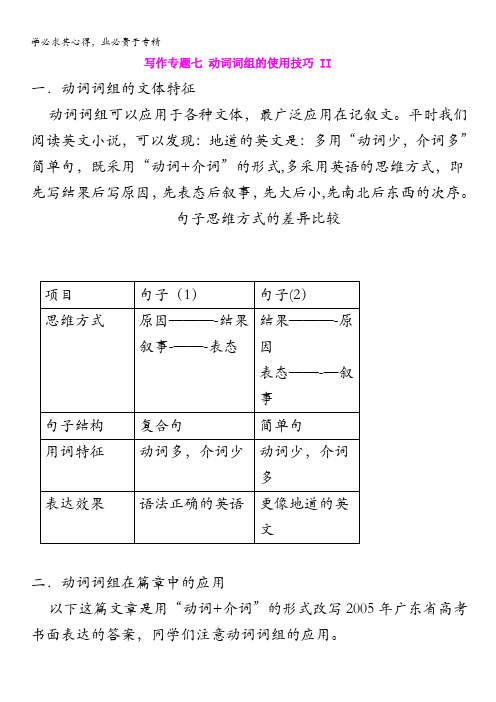
2008年高考英语基础写作
…Suspendedtwicein1928 and 1932 it regained its placeinthe Olympic Gamesin1932。 Women were allowed toparticipate inthe sportfor the first time inthe 1968 Olympic Games. As an Olympic event, shooting has beendevelopingsteadilywithonly three eventsin1896 but 17 eventsatthe moment.
两篇文章简单句很多,采用大量动词词组,副词、介词活跃,同学们觉得它符合记叙文的特征吗?按照你现在的语言水平,用哪一种表达方式比较保险合适和你呢?
写作专题七 动词词组的使用技巧 II
一.动词词组的文体特征
动词词组可以应用于各种文体,最广泛应用在记叙文。平时我们阅读英文小说,可以发现:地道的英文是:多用“动词少,介词多”简单句,既采用“动词+介词”的形式,多采用英语的思维方式,即先写结果后写原因,先表态后叙事,先大后小,先南北后东西的次序。
句子思维方式的差异比较
项目
句子(1)
句子(2)
思维方式
原因———-结果
叙事-——-表态
结果———-原因
表态——-—叙事
句子结构
复合句
简单句
用词特征
动词多,介词少
动词少,介词多
专题七、动词填空
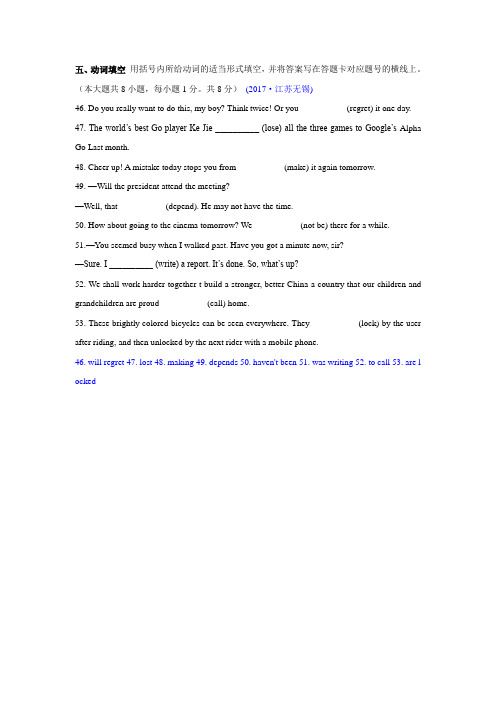
五、动词填空用括号内所给动词的适当形式填空,并将答案写在答题卡对应题号的横线上。
(本大题共8小题,每小题1分。
共8分)(2017·江苏无锡)46. Do you really want to do this, my boy? Think twice! Or you __________ (regret) it one day.47. The world’s best Go player Ke Jie __________ (lose) all the three games to Google’s Alpha Go Last month.48. Cheer up! A mistake today stops you from __________ (make) it again tomorrow.49. —Will the president attend the meeting?—Well, that __________ (depend). He may not have the time.50. How about going to the cinema tomorrow? We __________ (not be) there for a while.51.—You seemed busy when I walked past. Have you got a minute now, sir?—Sure. I __________ (write) a report. It’s done. So, what’s up?52. We shall work harder together t build a stronger, better China-a country that our children and grandchildren are proud __________ (call) home.53. These brightly colored bicycles can be seen everywhere. They __________ (lock) by the user after riding, and then unlocked by the next rider with a mobile phone.46. will regret 47. lost 48. making 49. depends 50. haven't been 51. was writing 52. to call 53. are l ocked。
- 1、下载文档前请自行甄别文档内容的完整性,平台不提供额外的编辑、内容补充、找答案等附加服务。
- 2、"仅部分预览"的文档,不可在线预览部分如存在完整性等问题,可反馈申请退款(可完整预览的文档不适用该条件!)。
- 3、如文档侵犯您的权益,请联系客服反馈,我们会尽快为您处理(人工客服工作时间:9:00-18:30)。
七.动词
这里所说的动词是指各种动词总称,其中包括be动词、情态动词、助动词、行为动词。
一. be动词(am, is, are, was, were )
1. am—was, is –was, are--were : 口诀:我用am, 你用are, is用在他她它,所有复数全用are。
2. 肯定和否定句:I am (not) from London. He is(not) a teacher. She is(not) in the dining room.
3. 一般疑问句: Are they American? Yes, they are. / No, they aren’t. Is the cat fat? Yes, it is. /No, it isn’t.
4. be动词的否定形式:am not(没有缩写形式),are not = aren’t ,is not = isn’t 。
◆课堂练习:
1、用be动词的适当形式填空。
1)I ______ a boy. ______ you a boy? No, I _____ not. 2)The girl______ Jack's sister.
3)The dog _______ tall and fat. 4)The man with big eyes _______ a teacher. 5)______ your brother in the classroom? 6)How _______ your father?
二. 助动词(do, does, did )
do, does用于一般现在时,其过去式did用于一般过去时。
它们通常用在疑问句和否定句中。
它们的否定形式:do not = don’t, does not = doesn’t, did not = didn’t。
注意:在一般现在时中,does用于第三人称单数,其余一律用助动词do;助动词do, does, did 后面一定要用动词原形。
◆课堂练习:
1、用适当的助动词填空。
1) ______you like this magazine?
2) The girl______like bread for breakfast.
3) ---What ______ she ______ at the weekends? ---She usually plays games with her friends.
4) ---What______ you do last Sunday? ---I wrote to my friend.
5) ---Did you see a Beijing opera? ---No, I ______.
6) He ______not visit a farm last National Day holiday.
7) They______ not like playing volleyball.
三、行为动词
表示某一动作或行为。
如:sweep、live等。
行为动词我们已学过它们的四种形式:原形、第三人称单数:+s/es、现在分词:+ing、过去式:+ed。
1. 动词第三人称单数变化规则:
A、一般直接加“s”,如:play – plays, visit – visits, speak – speaks ;
B、以“s”,“x”,“sh”,“ch”结尾时,加“es”,如:catch – catches, watch – watches ;
C、以“辅音字母+y”结尾时,变“y”为“i”再加“es”,如:carry – carries, study – studies 。
2.现在分词构成规则:
A、一般直接加“ing”,如:go – going, do – doing, look – looking ;
B、以不发音的“e”结尾的单词,去“e” 加“ing”,如:take – taking, make – making, have –having ;
C、以重读闭音节结尾的词,如末尾只有一个辅音字母,需要双写这个字母再加“ing”,如:put – putting, stop – stopping, run – running, get – getting, swim – swimming, sit – sitting, begin –beginning,
3.过去式构成规则:
A、一般直接加“ed”,如:plant – planted, visit – visited, pick – picked ;
B、以不发音字母“e”结尾,直接加“ed”,如:like – liked, hope – hoped, taste – tasted ;
C、以“辅音字母+y”结尾时,变“y”为“i”再加“ed”,如:try – tried, carry – carried, study – studied ;
D、以重读闭音节结尾的词,如末尾只有一个辅音字母要双写最后一个字母,再加“ed”,如:stop – stopped ;
◆课堂练习:
1、写出下列动词的第三人称单数。
drink ________go _________stay _________make __________look __________have _________ 2、写出下列动词的现在分词。
put __________give __________fly _________get ________dance ________sit_________ run
________
3、写出下列动词的过去式。
is\am _______fly ______plant ________are ________drink _________play _______go ________ 4、用动词的适当形式填空。
(1)They usually _______lunch at home. But last week, they ____lunch at school. ( have ) (3)That______my English book. It _____new. But now it _____not here. It ______there a moment ago. ( be )
(4)What _____ he usually ______on Sunday? He usually ______his homework.
Look! He __________his homework now. ______he _______his homework last Sunday? Yes, he_______. ( do )
四、情态动词
情态动词也是一类特殊的动词,平时我们不把它说成是动词。
情态动词可以和行为动词同时出现在同一个句子中。
我们现在学过的情态动词有:can、could、shall、should、will、would、may、might 、must。
注意:情态动词后动词总是用原形。
(不受其他任何条件影响)
其否定形式:can not = can’t, must not = mustn’t, …注意:may not(无缩写形式)
◆课堂练习:
( ) 1.The sign on the wall means you ______stay away from the building.
A. must
B. can’t
C. shouldn't
( ) 2. How many books ______ you see on the desk?
A. may
B. can
C. should
( ) 3. It means you ______ make noise in the library.
A. should
B.. shouldn't
C. can
( ) 4. --- ______you like a glass of milk ? --- Yes, please.
A. May
B. Could
C. Would
( ) 5. --- ______you see the sign over there? --- Sorry, I can’t.
A. Can
B. Can’t
C. Should
( ) 6. ______ we go to the park by bus?
A. May
B. Must
C. Shall。
